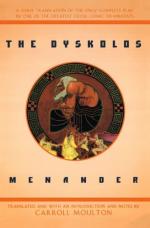|
This section contains 7,942 words (approx. 27 pages at 300 words per page) |

|
SOURCE: Konstan, David. “Grouch.” In Greek Comedy and Ideology, pp. 93-106. New York: Oxford University Press, 1995.
In the following excerpt, Konstan analyzes Menander's uses of passionate love in the Dyskolos in order to comment on class conflict.
Menandrean drama differs from the Old Comedy produced by Aristophanes and his contemporaries in its concentration on the domestic world, and above all on the vicissitudes of youthful passion—the passion, that is, of young men who are blocked by stern fathers, rich rivals, or greedy masters from attaining the women they desire, and must rely on intrigue or luck to gain them.1 Thus Plutarch observed that erōs played a role in all of Menander's comedies, and the rule holds for the plays of which we have any knowledge, including Duskolos, or Grouch (an alternative title is Misanthrope), which was produced in 316 b.c. when Menander was about twenty-five years...
|
This section contains 7,942 words (approx. 27 pages at 300 words per page) |

|


